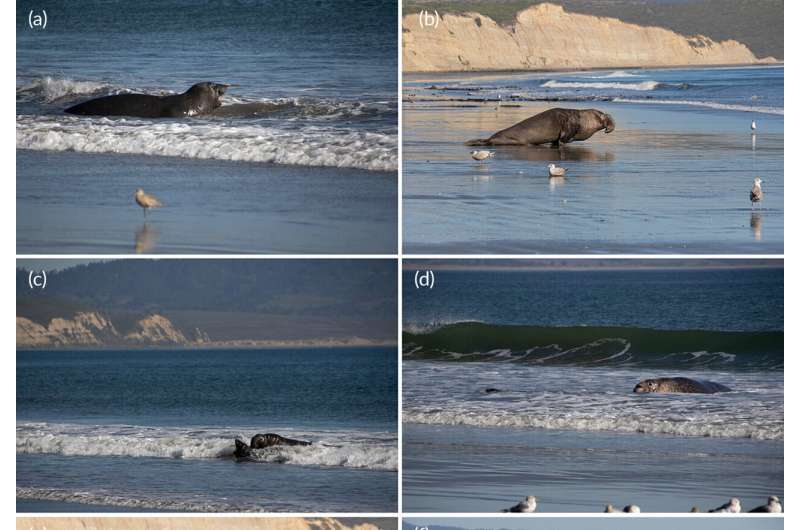February 8, 2024 report
This article has been reviewed according to Science X's editorial process and policies. Editors have highlighted the following attributes while ensuring the content's credibility:
fact-checked
peer-reviewed publication
trusted source
proofread
Act of altruism observed in bull elephant seal

A trio of ecologists has observed for the first time, an act of altruism performed by a bull elephant seal. In their paper published in the journal Marine Mammal Science, Sarah Allen, Matthew Lau, and Sarah Codde offer photographic evidence and describe the events they observed.
Male bull elephant seals are large and bulky and are known to lay around on beaches warming themselves. But they are also known for their ardent behavior during mating season—many have been seen crushing other animals, elephant seal pups and other objects as they attempt to reach and mount a female. The bulls are also known to fast during the breeding season, which means they typically only ever expend energy during mating maneuvers.
Thus, it came as a surprise when the three researchers, who happened to be walking down the beach at Point Reyes National Seashore in California, taking pictures of the elephant seals, came upon the bull as it hastened into the ocean to help a pup that had allowed the tide to overtake its position—it was drowning. Noting the rare behavior, the researchers pulled out their cameras and began recording the action.
The research trio said that they had first passed by the mother and her pup, and the bull as well. All had seemed normal. But as they made a return trip, they noted that the tide had pulled the pup into the water and it was yelling for help. The mother, rather than helping, was yelling back at her pup. The bull, meanwhile, reacted with purpose. It sprang into action, undulating its body in characteristic fashion and dragging itself into the water. Once there, it swam to the pup and very gently nudged it to shore, near to where its mother was waiting.
The researchers note that because the seal was expending energy it normally would have used for mating—energy that once lost, could prove hazardous to its own health—the behavior qualified as an act of altruism.
After their observation, the research trio searched the literature and could not find any other instances of such behavior by a bull elephant seal, suggesting it had been a unique event. They were not able to explain the seal's behavior, but suggest it must have been motivated by factors known only to the seal itself.
More information: Sarah G. Allen et al, An observation of potential altruism by a male northern elephant seal (Mirounga angustirostris), Marine Mammal Science (2024). DOI: 10.1111/mms.13105
Journal information: Marine Mammal Science
© 2024 Science X Network




















